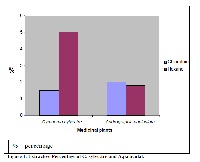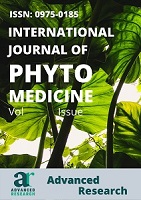Phytochemical investigation and antibacterial activity of Gymnema sylvestre and Andrographis paniculata from western ghats
Keywords:
Phytochemical, Gymnema sylvestre and Andrographis paniculata, western ghatsAbstract
In this study the antibacterial activity of Gymnema sylvestre (Retz.) and Andrographis paniculata collected from Western Ghats, Kanyakumari district, South India was made against common bacterial pathogens by filter paper disc-agar diffusion procedure. Both the plants showed considerable levels of antibacterial activity. Hexane extract of Gymnema sylvestre showed maximum inhibition against Serratia marcescens MTCC 86 and the Andrographis paniculata was effective against penicillin resistant Staphylococcus aureus MTCC 87. Phytochemical study revealed the presence of steroids/ terpenoids and coumarins in the extracts of both the plants. The bio-active compounds in the medicinal plants were extracted with Hexane and Chloroform (99 %) and further resolved by thin layer chromatography. Hexane extract of Gymnema sylvestre (Retz.) have 15 compounds and in its chloroform extract 25 compounds whereas 19 compounds in Chloroform extract and five compounds with Hexane extract was found in Andrographis paniculata. Further research is needed to characterize the compounds obtained and their mechanism of action on the bacterial pathogens.
References
Dahanukar SA, Kulkarni RA and Rege
NN. Pharmacology of medicinal plants
and natural products. Indian J. Pharmacol.
;32:81-118.
Sharma PV. Glimpses of Indian
ethnopharmacology. Proceedings of the
First National Conference on
Ethnopharmacology, May 24-26, TBGRI
Publication. 1995;pp: 233-242.
Geissman TA. Flavonoid Compounds,
Tannins, Lignins and Related
Compounds. In: Pyrrole Pigments,
Isoprenoid Compounds and Phenolic
Plant Constituents, Stotz, E.H. (Ed.)
Elsevier, New York. 1963;Vol. 9:pp: 265.
Schultes RE. The Kingdom of Plants. In:
Medicines from the Earth, Thompson,
W.A.R. (Ed.), McGraw-Hill Book Co.,
New York. 1978;pp:208.
Borris RP. Natural product research:
Perspective from a major pharmaceutical
company. J. Ethnopharmacol.
;51:29-38.
Bauer AW, Kirby WMM, Sherris JC and
Truck M. Antibiotic susceptibility testing
by standard single disk diffusion method.
Am. J. Clin. Path. 1966;45:493-496.
Dey PM and Harborne JB. Methods in
Plant Biochemistry. Vol.1., Academic
Press, London. 1991;pp: 47-58.
Sofowora A. Medicinal Plants and
Traditional Medicine in Africa. John
Wiley and Sons Ltd, New York. 1984;pp:
Kepm W. Qualitative Organic Analysis:
Spectrochemical Techniques. 2nd Edn.,
McGraw- Hill, London and New York,
ISBN 0070841586. 1986;pp: 197.
Sadasivam S and Manickam A.
Biochemical Methods. 2nd Edn., New
Age International Publishers, New Delhi.
;pp: 1-255.
Sanberg F and Bruhn JG. Sreeninig of
Plants for Bioactive Substances in Africa.
O.A.U. Press, Nigeria. 1979;pp: 119.
Mcrea WD and Towers GHN. Biological
activities of lignans. Phytochemistry.
;23:1207-1220.
Daroker MP, Mathur A, Dwivedi S,
Bhalla R, Khanuja SPS and Kumar S.
Detection of antibacterial activity in the
floral petals of some higher plants. Curr.
Sci. 1988;75:187–189.
http://203.190.147.121/bitstream/123456789
/83/1/J_Current%20Science_75_187.pdf.
Dharmaratne HRW, Wijesinghe WMN
and Thevanasem V 1999. Antimicrobial
activity of xanthones from
Calophyllum species, against
methicillin-resistant Staphylococcus
aureus (MRSA). J. Ethnopharmacol.,
: 339–342. doi: 10.1016/S0378-
(98)00239-6.
Khan R, Islam B, Akram M, Shakil S and
Ahmad A et al. Antimicrobial
activity of five herbal extracts against
Multi Drug Resistant (MDR) strains of
bacteria and fungus of clinical origin.
Molecules. 2009;14:586-597.
Mishra AK, Mishra A, Kehri HK, Sharma
B and Pandey AK. Inhibitory activity of
Indian spice plant Cinnamomum
zeylanicum extracts against human
and plant pathogenic dematiaceous
moulds. Ann. Clin. Microbiol.
Antimicrob. 2009;8:9-
doi:10.1186/1476-0711-8-9.
Mahfuzul Hoque MD, Bari ML, Inatsu Y,
Juneja VK and Kawamoto S.
Antibacterial activity of guava
(Psidium guajava L.) and Neem
(Azadirachta indica A. Juss.)
extracts against foodborne pathogens and
spoilage bacteria. Foodborne Pathog. Dis.
;4:481-488.
doi:10.1089/fpd.2007.0040.
Tripathi AK, Verma N, Prajapati V,
Khanuja SPS, Shasany AK, Satpathy S
and Kumar S. Plant extracts and
compounds active against the crop insectpest Helicoverpa armigera. J.
Med. Arom. Plant Sci. 2000;22/23:125-
Patra DD, Chattopadhyay A, Mishra HO,
Alam M and Khanuja SPS et al..
Agrotechnology of kalmegh
(Andrographis paniculata). J.
Med. Arom. Plant Sci. 2004;26:534–537.
Vlietinck AJ, van Hoof L, Totte J, Lasure
A, Vanden Berghe D, Rwangabo PC and
Mvukiyumwami J. Screening of hundred
Rwandese medicinal plants for
antimicrobial and antiviral properties. J.
Ethnopharmacol. 1995;46:31-47.



